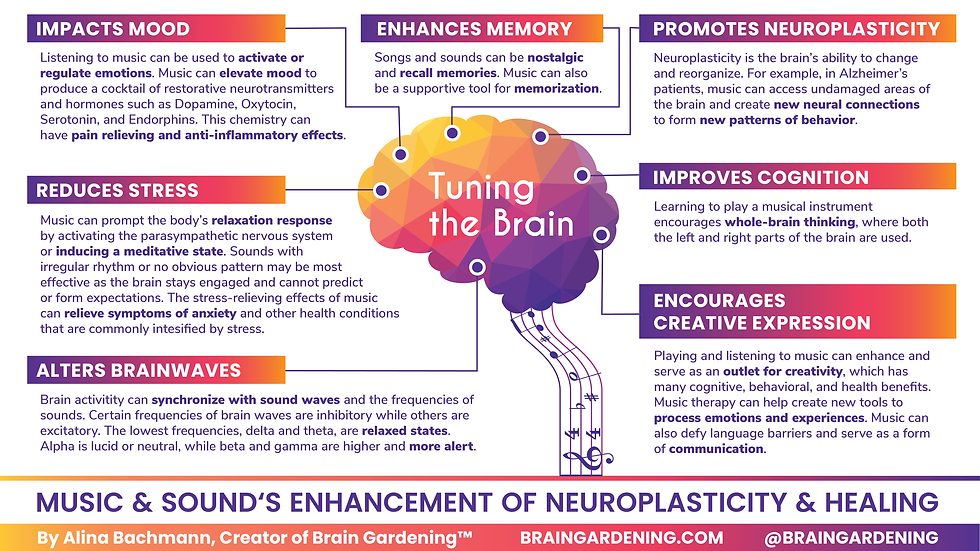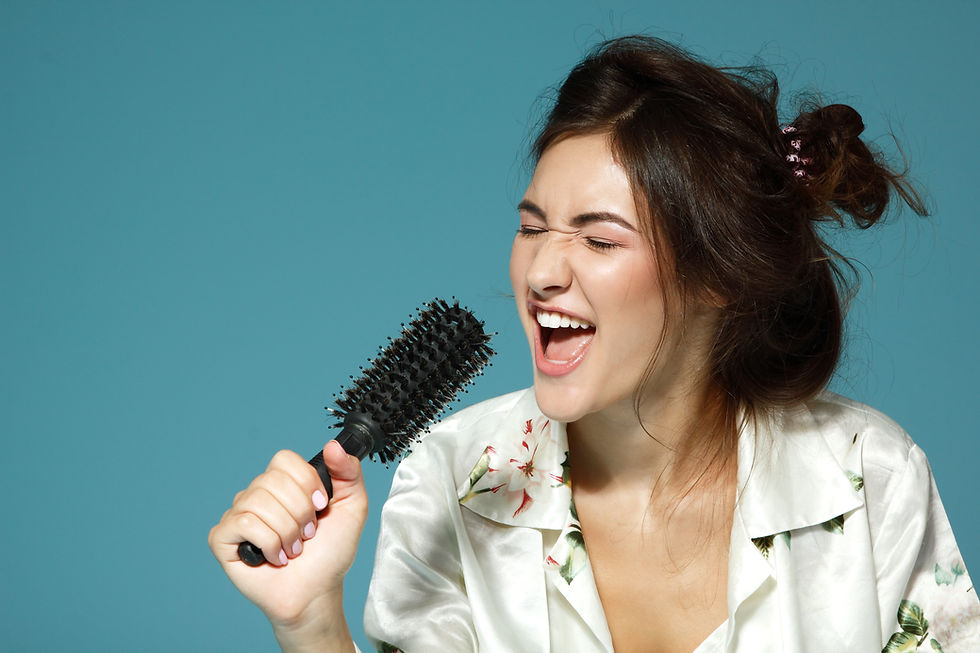Singing for Healing
- Alina Bachmann

- May 26, 2021
- 4 min read
This post is part of my Rewiring for Creativity series. Last year I made a change in the format I offer the posts as I was trying to pack a lot of info into one single post at the beginning of the series, so I'm going backwards and out of order to offer more information from this point forward (or backwards? 🙃).

It's been nearly 6 months since my original post on Music and Neuroplasticity and in a couple of weeks I will graduate the Integrative Sound and Music program I previously mentioned. I have a lot more information and research to share, which will be included as part of my upcoming neuroplasticty program, but I wanted to take the time to share a bit more on the topic of music and sound in this space as I only scratched the surface of possibilities.
Just to illustrate, as part of the midterm reflection for the program, I created the following infographic to summarize some of the ways music/sound impacts our brain.

A bit busy, isn't it? 🤣 Like I said, I learned A LOT about sound's ability to enhance or accelerate healing. Which is why a course format, rather than an infographic, is necessary to reflect what all of this information actually means for rewiring the nervous system out of a sympathetic-dominant state.
However, with this entry I'd like to share briefly on the healing benefits of singing.
History would show that the concept of song as healing or therapeutic isn't at all a secret.
Song can be used as a medium for emotional expression, including processing trauma.
For example, in the program I went through, I learned about "spirituals" or songs that were created by those enslaved in the American South. The African American spiritual is one of the largest and most significant forms of American folksong. Spirituals are a form of expression that speaks to spirituality and resilience. They are an outlet for processing experiences or reflecting upon experiences. Many spirituals, known as "sorrow songs," are intense, slow, and melancholic. Spirituals are a vehicle for protest and communication that allow for the supportive release of repressed emotions.

The act of singing also has physical health benefits, because it activates the parasympathetic nervous system.
The vagus nerve connects to your vocal cords, and whether or not you are a talented singer, the act of making sounds will stimulate the vagus nerve and increase heart rate variability and vagal tone. Having higher vagal tone means that your body can relax faster after stress. Humming and chanting provide the same benefits.
Singing can relief stress, lowering cortisol levels in the body and releasing endorphins which can have pain-relieving effects on the body. Mirror neuron benefits are also available to amplify the experience when singing in a group environment, like a choir. A 2012 study found that singing, drumming, and dancing in a group encourages the release of hormones that raise pain tolerance in ways that just listening to music doesn’t.

Deep breathing and the controlled use of muscles in the respiratory system while singing can also support health and wellness. Singing songs may also improve memory retention and recall. If you ever had to memorize something, turning it into song form may have helped support the process. Likewise, singing familiar songs can also connect to and unlock memories. Singing can also help with speech and cognitive issues by connecting to other areas of the brain that get activated at the same time. This may enable people with an impairment in one part of the brain to communicate using other areas of their brain.
I've never considered myself a singer or one who sings well, but song has been a way to express and give energy to my voice, something that historically I felt I should silence or weaken because I did not believe it to have purpose or significance. Through the process of this journey of rewiring, I've discovered how limiting those beliefs were for unlocking the vastness of my potential. I didn't fully see this until the sound healing program where there were many classes focused on vocalizations. I felt my limbic system's resistance to being heard, but I'm in the process of freeing my voice.
If you're interested in pursuing this yourself, my mentor Silvia Nakkach has a book called Free Your Voice: Awaken to Life through Singing. She shares how to reclaim the healing potential of your voice (regardless of training or experience) through more than 100 enjoyable exercises that are steeped in spiritual tradition and classical vocal technique and backed by the latest science.
Until next time! 🙂
About the Series:
Every other Wednesday, I give more insight on tools I used to heal from chronic health issues, anxiety, and tap back into my creative self as part of my Rewiring for Creativity series. Last year, I introduced this series as a way to show how creativity and neuroplasticity work together. I have been sharing some of the ways I integrated creative pursuits on my journey to recovery and how I dissolved my own creative blocks that separated me from this healing reservoir.
As a summary to what has already been discussed, I offer the following quick list:
Doodling The Brain Benefits of Doodling
Photography Photography as a Mindfulness Practice for Increased Neuroplasticity Creating New Associations with Phobias through Photography
Decorating Reassociating and Redecorating Spaces Gardening for Mental/Physical Wellness Clothing for Mood Elevation Decorating for Mood Elevation

About Alina
Alina is a multidisciplinary artist who used brain retraining coupled with creative pursuits to recover from a lifetime of chronic illness. Her healing journey has inspired her to create Brain Gardening™, an online resource featuring resilience tools that are rooted in science and cultivated through the arts.
Brain Gardening™ takes neuroplasticity research and presents it through a designer lens using simple language and interactive materials, while reflecting the deep insight of Alina's personal experience navigating the journey herself. Through this platform for healing, Alina will be creating and curating evidence-based resources for cultivating wellness through neuroplasticity that can be incorporated into an existing self-care practice or serve as an introduction to neural retraining techniques.
Subscribe to the mailing list at Brain Gardening™ to stay informed as new offerings emerge.
If you're on Instagram, follow @braingardening where you can find Alina's "Mindful Moments in Nature" every Monday and "Ask Alina" where you can submit your own brain retraining questions for answers on her monthly IGTV series.





Comments